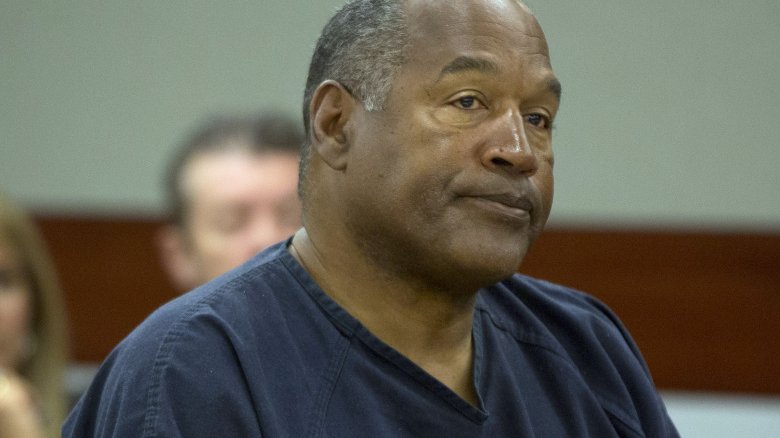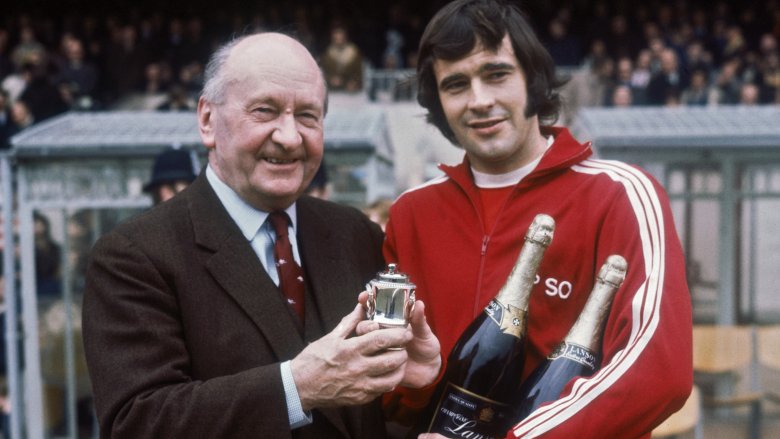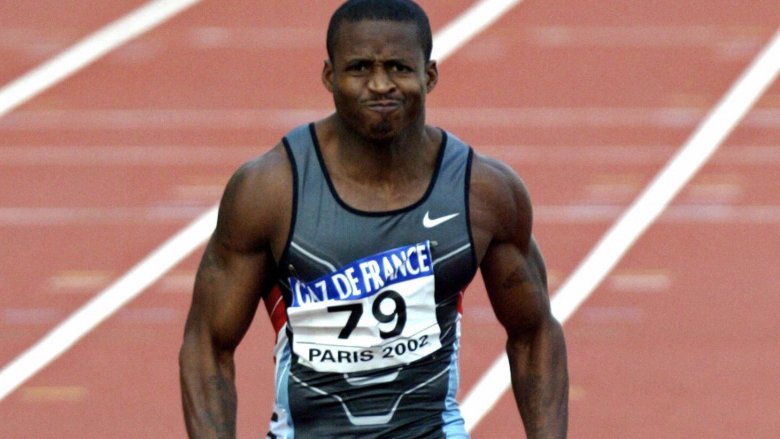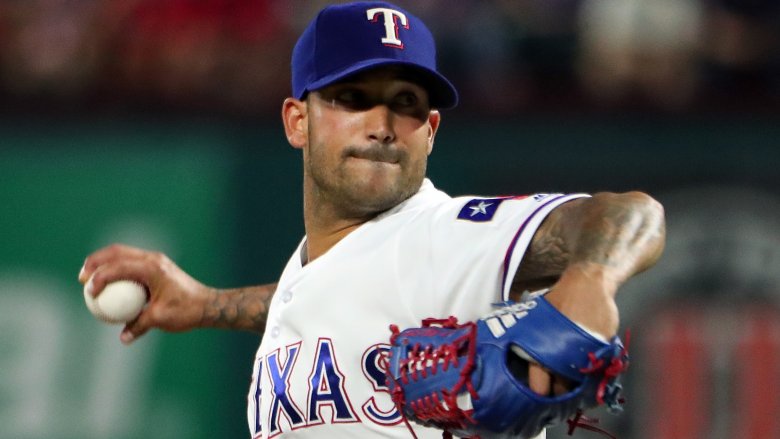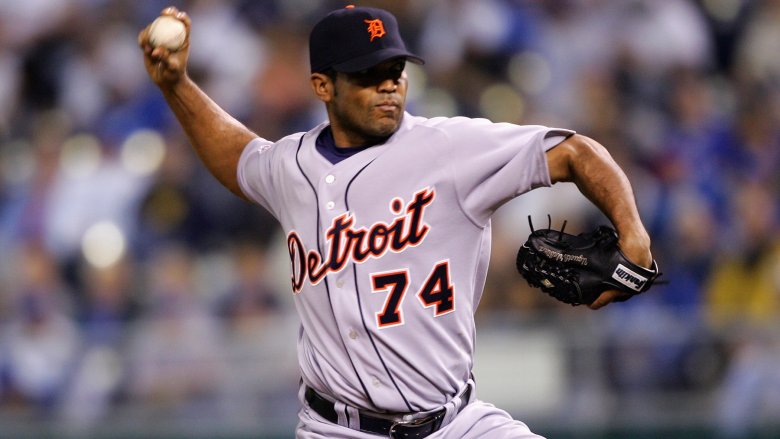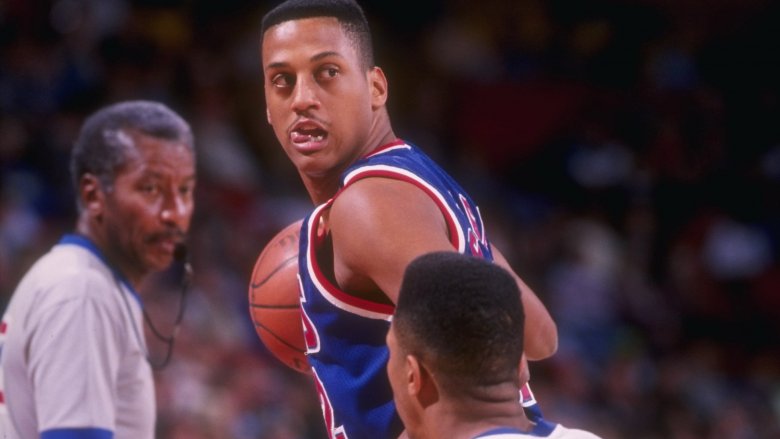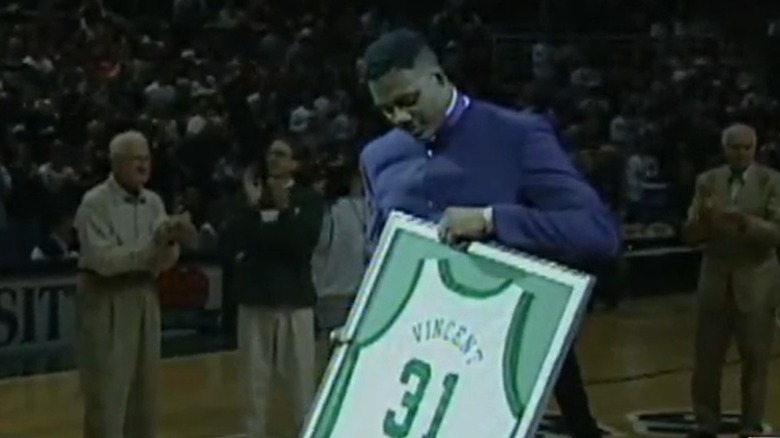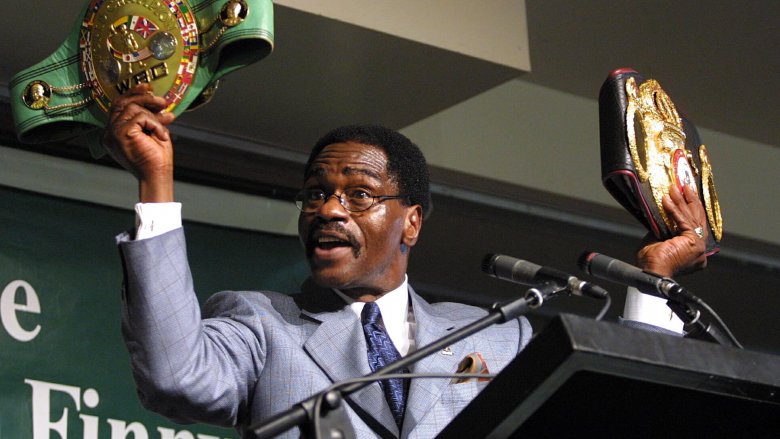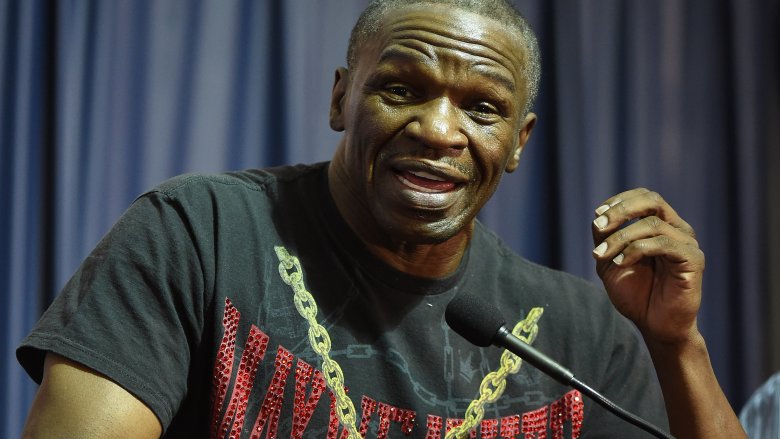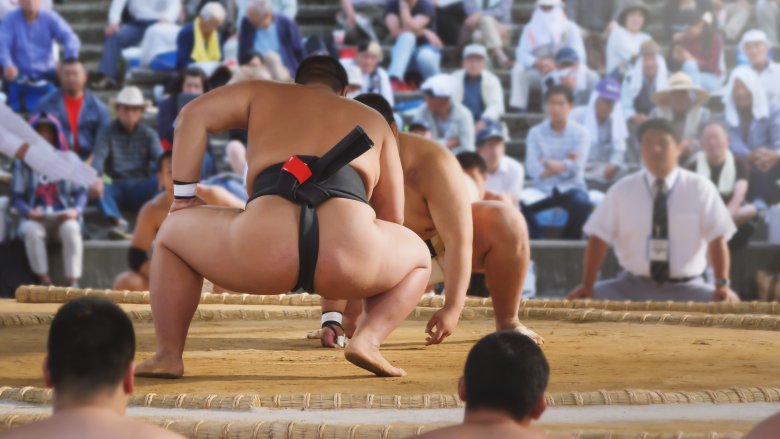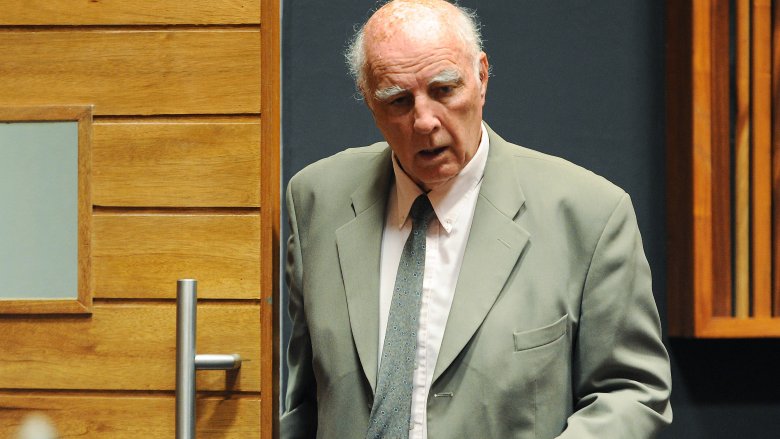Athletes Who Have Done A Lot Of Jail Time
Not every athlete is a saint, and plenty have wound up in the slammer from time to time. But some have proven so egregious when away from their game that they require harsher, longer punishment. Here are some jocks who've found themselves jailed for a good long time.
Art Schlichter
Art Schlichter loved football, but he loved gambling more and is paying a mighty high price for it. Starting in high school, Schlichter fell in love with betting on races and games, then continued to do so throughout his high school, college, and professional careers. His NFL career died by 1986, thanks in large part to his constant betting on basically everything. He's also lost freedom: According to CBS News, he's been sent to over 44 prisons since 1994. His most recent prison tour will prove to be his longest yet.
In 2011, Schlichter was arrested on charges that he had bilked sports fans out of millions of dollars by promising them tickets to events like the Super Bowl. He, naturally, did not deliver those tickets, and simply ran off with the money. As federal prosecutors said in a statement, "Schlichter ... spent the money on personal expenses, gambled with it, or used it to repay older debts." The next year, he was found guilty and sentenced to just under 11 years in prison. Considering how he seems completely unwilling or unable to learn his lesson or curb his addiction, don't expect him to get out anything resembling early.
OJ Simpson
Once known for either football or The Naked Gun, depending on who you talk to, OJ Simpson has spent almost as much time in prison as he did in the NFL. But he could well have been in there for much longer.
Simpson famously avoided prison time for the murders of his ex-wife, Nicole Brown, and her friend, Ron Goldman, but he wasn't nearly as lucky in 2007, when he was arrested for robbing sports memorabilia collector Bruce Fromong in a Las Vegas hotel room, because Fromong had memorabilia Simpson believed was his. He was convicted in 2008 of both robbery and kidnapping, and sentenced to anywhere from 9 to 33 years. Ultimately, he served the minimum nine and was paroled in 2017 after a hearing that was broadcast all over the country because, after all this, he's still a celebrity.
On October 1, 2017, he walked out of prison, and will hopefully do everything in his power to stay crime-free for the rest of his days.
Peter Storey
Peter Storey was known as a "hatchet man" during his soccer-playing days, and while he thankfully didn't become that during his life of crime, what he did do wasn't much better.
After 15 years of playing with Arsenal plus one more with Fulham, Storey began his second career: criminal. He recapped all of it in his autobiography, True Storey: My Life and Crimes as a Football Hatchet Man. In 1980, Storey was convicted as the moneyman in a conspiracy to produce counterfeit money and wound up behind bars for three years. Later on, in 1982, he wound up in trouble for stealing two cars; his punishment was two six-month prison terms, which were eventually suspended.
If all that wasn't enough, in 1990 he was caught trying to smuggle porn movies from the Netherlands into England, stuffing the smut into his car's spare tire. He was arrested, convicted, and sentenced to four weeks in jail. He's stayed clean in the decades since, marking what seems to be the end of his crazy criminal tale.
Tim Montgomery
Tim Montgomery was a champion sprinter for the USA who once held the world record for the 100-meter dash. But now, he's known primarily as a disgrace to his sport due to a series of bad decisions that led to extended incarceration.
According to the BBC, Montgomery was banned for life from athletics in 2005 after getting caught using steroids — this also cost him his world record. Everything went downhill from there. In 2008, Montgomery was sentenced to five years in prison for attempted heroin dealing. He was caught with over 100 grams, an awfully large inventory by any interpretation. That in itself would be bad enough, but Montgomery was convicted while serving an unrelated four-year sentence for writing bad checks to the tune of $1.7 million. The unsympathetic judge wasn't eager to combine the sentences, meaning once Montgomery finished one, he started another. Come on, Tim. Please think of better ways to keep yourself busy.
Matt Bush
Matt Bush was a #1 draft pick for the San Diego Padres in 2004, though he didn't exactly live up to the hype. He simply had too many issues with alcohol and anger management, getting drunk and fighting several times over the next few years. This meant his dismissal from the Padres, as well as the Toronto Blue Jays and the Tampa Bay Rays' minor league system. Then, his bad behavior went many steps too far.
In 2012, the athlete was driving drunk (according to the Tampa Bay Times, his blood-alcohol content was 0.18, over twice the legal limit) when he hit 72-year-old Tony Tufano with his car. That's bad enough, but then he drove away, making things infinitely worse. He was arrested and charged with DUI with serious bodily injury (thankfully, Tufano survived), eventually pleading no-contest. He would serve 3.5 years in prison, getting out in late October 2015. Shortly thereafter, the Texas Rangers signed him to a contract, and in May 2016 he made their major league roster. As long as he doesn't succumb to anything stronger than a sweet, dark root beer, he might stand a chance at reminding people why he was the top draft pick.
John D'Acquisto
John D'Acquisto spent ten years in Major League Baseball and ten more behind bars, perhaps because balance is important.
After a journeyman career where he pitched for six teams in a decade, never once achieving a winning record, D'Acquisto retired in 1983 thanks to arm surgery. He then got into finances, which in this case really means swindling. He once forged a $200 million certificate of deposit and tried to use it as collateral in a deal with Prudential Securities. That proved to be a stupid idea, as he was convicted of forgery and wire fraud in 1996, and sentenced to 63 months in prison. He wasn't even out of prison before getting in trouble again; in 1999, he faced charges of wire fraud and money laundering. He had gotten many businesses to invest millions in his properties, promising high-interest yields. In truth, the only interest here was the interest D'Acquisto had in using other people's money to buy stuff for himself: horses, expensive cars, plus property and even a minor league ball club down in Mexico.
For his trouble, D'Acquisto was rewarded with an additional 55 months in prison, just two months shy of an entire decade in the pokey. He did get to have fun with horses before he went away, so he's got that going for him.
Denny McLain
As ESPN Classic put it, athlete Denny McLain was famous for two reasons: winning 30 games in the 1968 season (the last pitcher to win that many), and for being a jailbird.
McLain was suspended by the Detroit Tigers in 1970, after Sports Illustrated reported his participation in a bookkeeping operation back in 1967. It was a sign of things to come. After retirement, McLain bounced from gig to gig before finally becoming a partner in First Fidelity Financial Services, which may or may not have been a front for the Mob. There, he got into crime, and in 1985 was found guilty of racketeering and extortion. He originally got 23 years in the slammer, but after various negotiations and procedural issues, that became five years' probation.
What a break! Lucky enough for anyone to get the point and keep it clean, right? Not McLain. In 1994, he bought a meat-processing company that soon went belly-up. He and his associates stole $12 million from the company's pension fund. Bad move: In 1996, he was convicted of conspiracy, money laundering, and mail fraud, and sentenced to eight years in prison. He served six, which was as nice as the justice system was willing to be the second time around.
Blackie Schwamb
Ralph "Blackie" Schwamb might've been one of the greatest Major League Baseball players ever, but we'll never know because he only made it there a month before committing to his second career as a murderer.
Prior to baseball, Schwamb was already a tough, working as an enforcer for Mafia boss Mickey Cohen. He would play sandlot baseball in his spare time, and that's where a scout for the St. Louis Browns found him in the 1940s. He was quickly signed to a contract because, in the scout's own words, "He's a screwball, but he can pitch." Talk about an understatement — after just 12 unimpressive starts, Schwamb screwed up huge, beating a doctor named Donald Buge to death in Long Island, during what the Baseball Hall of Fame's website deems "a robbery gone awry." He was sentenced to life in prison in 1949, but won himself parole in 1960.
Needless to say, no team wanted to take a chance on a guy who came and went so quickly over a decade ago with nothing to show for it. So Schwamb retired to anonymity, where he remained until his death in 1989.
Hank Thompson
Hank Thompson was a star third baseman who joined the New York Giants (of baseball) from the Negro Leagues in 1949. Over the next eight years, he helped the Giants win two World Series before retiring in 1957. After that, came more than a few issues. He worked as a cabbie in New York City (long before you could play two years in professional sports and make enough money to last you the rest of your life), later moving to Texas after a divorce. There, apparently desperate for money, he committed armed robbery and was quickly arrested, according to the AP. In 1963, he was sentenced to ten years in prison, but won parole after four.
Unfortunately, just a couple years later, in 1969, Thompson suffered a massive seizure and died. He was attempting to turn his life around at the time, re-marrying, becoming a playground director, and working with underprivileged kids to make better choices than he did.
Ugueth Urbina
Ugueth Urbina has two memorable things about him: an awesome name, and an extended stint in prison. There was the baseball thing, too — he spent 11 years on multiple teams, mostly with the Montreal Expos, where he made the All-Star Team twice. In 2003, he helped the Florida Marlins win the World Series, before moving on to the Tigers and the Phillies. But in October 2005, he sought to defend himself and paid dearly for it, with both his freedom and his career.
While at home on his Venezuelan ranch, Urbina noticed several strange men on his property. He could've called the cops, but instead he chose an extreme method of home protection. He chased after them with a machete, attempting to cut up at least one of the men. Then he tried to set the rest on fire, which is, admittedly, an effective deterrent. It's also stone-cold illegal, however, and Urbina was convicted of attempted murder in 2007. He was given a 14-year sentence, but served seven, being released around Christmas 2012. (He had been in prison since his November 2005 arrest.) Unfortunately, Santa didn't bring him a new contract, and he's been out of baseball ever since.
Darrell Allums
Darrell Allums was a star basketball player at UCLA, but not one who could channel that into success at the NBA level. After just a year in the pros (1980-1981), he was gone. He sadly developed a bad cocaine habit in retirement, one he soon struggled to pay for. To do so, he began robbing Domino's Pizza delivery guys in 1987, ultimately being arrested for 14 separate robberies. Worse, since he wielded a screwdriver when mugging the workers, it was considered armed robbery.
By trial's end, Allums had been convicted of eight of the robberies and sentenced to nine years in prison. Though the judge was sympathetic (he was quoted by the LA Times as saying, "I am convinced that, but for drugs, Mr. Allums never would have been here"), crimes were committed, so time had to be doled out.
Tate George
Tate George played basketball for the New Jersey Nets from from 1990 to 1993, then the Milwaukee Bucks in 1995. He didn't do much of anything even a casual fan would call impressive, so he needed money after basketball. He got it, albeit briefly, by running a gigantic Ponzi scheme. He founded a real estate investment company called The George Group, but it was nothing but a cover for a scam that exceeded $2 million. Between 2005 and 2011, he worked to convince many investors — including some former pro athletes — to invest in supposedly high-return real estate. In reality, he simply used their money to pay off other investors, as well as live a high-priced life for himself.
He was charged with wire fraud in 2011 and convicted in 2013. He was sentenced to nine years in prison, a decision he attempted to have overturned because of supposed withheld evidence and false testimony from the FBI. Not only did that fail, he was also ordered to pay $2.5 million in restitution. He'll get out eventually, and hopefully he focuses on honesty going forward.
Jack Molinas
Jack Molinas is known less for basketball than for almost destroying basketball. He would constantly bet on games, many of which he was playing in. He played for one season in the NBA, back in the '50s, but was almost immediately banned for life for his gambling.
In response, as described in the book The Wizard of Odds, Molinas began working with college players to make money by making basketball more fixed than pro wrestling. He would recruit players to intentionally score less and throw games, and he would then sell the fixed games' odds to bookies. That, along with his own betting on the game, brought him tens of thousands of dollars a week — even today, that's a ton of money. In the '50s and '60s, it was practically astronomical.
As with any scheme, however, this one eventually came crashing down. By 1961, 37 college players were arrested for their part in the scheme, and Molina himself was sentenced to 10-15 years behind bars for running the entire operation. He was released after five years and found a second, more honest career: pornography. Of course, according to ESPN Classic, his job was to smuggle in porn from Taiwan, so maybe it wasn't too honest after all. Either way, he met his end in 1975, shot in the back of the head. It may have been the Mafia taking revenge on Molinas for unpaid debts which, considering his life's work, makes a ton of sense.
Jay Vincent
Jay Vincent had a decent NBA career, averaging 15 points a game over nine years. He then spent several years in international leagues before retiring in 1993. Eventually, he turned to scam artistry, in order to make a dishonest buck.
In 2010, Vincent was charged with mail fraud, after he and a partner were accused of taking over a million dollars from over 20,000 people. He took their money and told them they would become inspectors, through a company called Foreclosure Bank Inspection. This, as you probably suspected, did not happen. All that did happen was Vincent and his friend kept the money for themselves. That's bad enough, but then they didn't pay taxes on their ill-gotten booty, making the IRS less than happy. So Vincent also wound up with tax evasion charges, and was convicted of both that and the fraud. He received 5.5 years in prison for the frauds and three for the tax issue. The judge had the sentences run concurrently, and ultimately Vincent was released four years and seven months later, in early 2016.
He got a job quickly after leaving prison — according to CBS Detroit, Vincent started working at a local burger joint called Juicy Burger, as kind of a local celebrity draw. It was the first step in his plan to start his life again after prison, and for his sake, hopefully he does.
Rubin Carter
Boxing fans and Bob Dylan fans alike are well aware of the story of Rubin Carter. After all, he's the Hurricane, the man the authorities came to blame.
As CNN wrote, in 1964 Carter was on top of the boxing world. He had won 11 out of his first 15 fights and was all set to challenge the middleweight champion of the world. He lost, and thereafter became a different boxer. He went 8-7 in his final 15 fights, and then was accused of killing three people in 1966. He was arrested and convicted the next year, then sentenced to three life terms for the deaths. Eventually, however, people began to suspect Carter didn't do it, a sentiment most famously shared by Bob Dylan in his 1976 song "Hurricane." A year after that song, and a decade after Carter was sent to prison, he won himself a new trial ... and was convicted again. Back to prison he went.
Then, in 1985, that second conviction was also overturned after a federal judge ruled he never got a fair trial. This time, Carter's freedom stuck, and by 1988 he had all charges against him dismissed. From then until his death in 2014, Carter worked tirelessly to advocate for the wrongly convicted. He even worked as Executive Director of the (Canadian) Association in Defence of the Wrongly Convicted from 1993 until 2004. He never became a champion in boxing, but he definitely became a champion of life and freedom.
Floyd Mayweather Sr.
Along the road to building an incredible 50-0 record, Floyd Mayweather Jr. spent two months behind bars for domestic assault. That's nothing compared to his father, Floyd Sr., who may have beaten fewer opponents than his son but has him beat on time spent in a cell.
Mayweather Sr. was a fine boxer in his own right but, as The Guardian points out, he was also a drug dealer, supplementing his income and providing for his kids by smuggling cocaine across state borders. The bottom fell out in 1994, when Senior was caught trying to transport coke from Chicago to Grand Rapids, Michigan. He received a five-year sentence for that, and not even his son's attempt at writing President Clinton, begging him to pardon his father, stopped it from happening. Senior did four years of his term before being released in 1998; eventually, he fully dedicated himself to being an on-again-off-again trainer for his son.
Mike Danton
Mike Danton played three years in the NHL before parlaying his experience into five years of prison time. In 2004, he was arrested on charges that he had attempted to hire someone to kill his old coach, mentor, and agent, David Frost. For some reason, paranoia apparently overtook Danton, and he started to believe Frost was going to hurt him. He was willing to pay $10,000 to have him bumped off. Meanwhile, prosecutors were willing to put him in the clink for even trying to do that.
Danton was sentenced to 7.5 years behind bars, but only served five before being granted parole. During the parole hearing, he told board members that he wasn't attempting to have Frost killed, but rather his own father. Yes, he fully believed at the time that his estranged father was trying to kill him, to which a board member actually responded, "Why on Earth would you believe that? That's like talking about the bogeyman." Danton believed his paranoia came from sleeping pills he was taking, though whether those pills also made him want to pay so much to have his father killed, he hasn't confirmed. Danton has since been quietly playing minor league hockey around the world.
Steve Durbano
Steve Durbano might be the ultimate hockey goon. In just 220 NHL games, he amassed 1,127 penalty minutes, meaning on average, he spent over five minutes of each game in the penalty box for one violent act or another. It almost makes sense, then, that someone that volatile would turn to crime.
In 1981, several years after finally retiring from his own private fight club, Durbano found himself involved in drug trafficking. In particular, as explained by the Globe and Mail, he was part of a plot to smuggle over $568,000 worth of cocaine into Canada. He was caught, charged, and sentenced to seven years behind bars. He lucked out and was released after 28 months, but he didn't exactly go straight. In 1998, he added an additional three months to his rap sheet after attempting to hire a woman for his prostitution ring. Problem was, this potential employee was a cop, and Durbano was quickly in cuffs again. After that, he stayed straight, moved to the Northwest Territories, and lived there in peace until his death from liver cancer in 2002.
Junichi Yamamoto
Junichi Yamamoto was a sumo wrestling legend, who eventually became a sumo wrestling disgrace. When active, he was a successful star, rising all the way up to Komusubi, the fourth-highest rank in sumo. Upon retirement, he became a trainer, which is where his reputation and life eventually fell apart.
In June 2007, a 17-year-old sumo student named Takashi Saito was found beaten to death at a stable run by Yamamoto. He and three of his students were arrested in connection with Saito's death. All four were eventually found guilty of beating and exercising Saito to death after he supposedly tried to run away from the dojo. The three students all received suspended sentences — according to CNN, "The judge said [the students] had only followed their coach's instructions and the traditions of the sport." The coach, being the mastermind, received full punishment, even though he apparently did not take part in the beatings. In 2009, he was sentenced to six years in prison. According to one Japanese website (though apparently not reported elsewhere), Yamamoto died in August 2014 of lung cancer.
Bob Hewitt
Bob Hewitt was once a tennis great, winning multiple Grand Slam championships during his career in the '60s and '70s. In 1992, the athlete was rewarded for his career with an induction into the International Tennis Hall of Fame. But now, he's out of the Hall and few people, if any, care about his on-court accomplishments because Bob Hewitt is a convicted child rapist.
After retiring, Hewitt became a trainer for young tennis students in South Africa. There, over the '80s and '90s, Hewitt raped at least three girls, all between the ages of 12 and 14. On one case, according to the victim, he admitted to her that he thought "rape is enjoyable." Public allegations, however, didn't come up until around 2011; the next year, the International Tennis Hall of Fame removed him from its honorable walls. As it turns out, this was totally the right move. In 2015, he was convicted of raping two girls and sexually assaulting a third. After a failed appeal in 2016, Hewitt began serving his six-year sentence; since he entered prison at age 77, it remains to be seen if he'll ever see the world beyond prison walls again.
